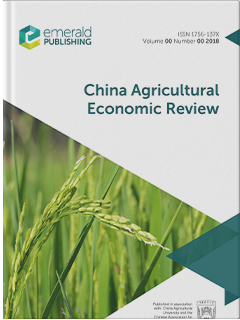Process decomposition of expanded rural housing at the rural–urban fringe: evidence from 27,034 buildings in Pudong New Area, Shanghai, China
IF 4.6
2区 经济学
Q1 AGRICULTURAL ECONOMICS & POLICY
引用次数: 0
Abstract
PurposeFaced with the challenges of rural population decline, combined with the widespread expansion of homesteads in rural areas, local Chinese governments hope to strictly control and minimize rural housing land. Accurately decomposing the process of rural housing expansion and revealing its driving factors will be helpful for land-use regulation by the government.Design/methodology/approachIn this study, an unusually rich dataset of rural housing registration from Pudong New Area in Shanghai is employed. The study aimed to decompose the fragmented accumulation process and its expansion determinants on rural housing assets. The dataset covers all samples of rural households and housing plots at 72 surveyed villages in six towns.FindingsHousing offers profitable capital and earning assets to villagers at the urban fringe, so they have a powerful incentive to build and expand more. The results of this analysis showed that the expansion of rural housing is largely due to the haphazard construction of auxiliary rooms by villagers, especially on plots of arable land that are adjacent to their houses that have been stealthily converted into auxiliary rooms and sheds. Low costs and weak penalties have led to an increase in rent-seeking expansions to rural houses. Houses with the smaller initial areas, families with more laborers and household heads, and the proximity of villages to downtown with convenient living services were the main driving factors for expanding houses. A concerted effort is needed to control the disorganized and unlicensed expansion of housing. This effort should include formulating areas for free use by villagers, high taxes on overused areas, serious penalties for unlicensed housing expansion and effective land-use planning.Research limitations/implicationsAn understanding of the expansion status and control measures related to rural houses in Shanghai provides an important reference that can help to guide the formulation of rural housing policies, and the sustainable development of cities worldwide. Of course, this study cannot generalize about housing distribution and expansion status worldwide based on the study area in China, because China's land tenure policies are unique. But land registry data exists that makes research like this feasible. There is a need to carefully examine the detailed housing distribution in each country before it can be decided on how best to address the disorderly increase in rural housing stock, and promote the reduction of rural residential expansion.Originality/valueFirst, the process of rural housing expansion by using an unique dataset which covers ten thousands of samples is revealed. Second, the results have policy implications for reducing the amount of idle and inefficiently rural homestead. The focus is on rural housing growth and its driving factors in Shanghai, and the villagers' motivations for housing expansion are explored.城乡结合部农村扩大住房的过程分解——来自上海浦东新区27034栋建筑的证据
目的面对农村人口减少的挑战,再加上农村宅基地的广泛扩张,中国地方政府希望严格控制和尽量减少农村住房用地。准确地分解农村住房扩张的过程,揭示其驱动因素,有助于政府对土地利用的调控。设计/方法/方法本研究采用了一个来自上海浦东新区的异常丰富的农村住房登记数据集。该研究旨在分解农村住房资产的碎片积累过程及其扩张决定因素。该数据集涵盖了六个城镇72个被调查村庄的所有农村家庭和住房地块样本。FindingsHousing为城市边缘的村民提供了有利可图的资本和赚钱的资产,因此他们有强大的动力来建造和扩建更多的房屋。分析结果表明,农村住房的扩张很大程度上是由于村民随意建造辅助用房,尤其是在他们房屋附近的耕地上,这些耕地被悄悄地改建为辅助用房和棚屋。低成本和处罚不力导致了农村房屋寻租扩张的增加。初始面积较小的房屋、劳动力和户主较多的家庭以及生活服务便利的村庄靠近市中心是扩大房屋的主要驱动因素。需要共同努力来控制无序和无许可证的住房扩张。这项工作应该包括制定村民免费使用的区域,对过度使用的区域征收高税,对无证扩建住房的行为进行严厉处罚,以及有效的土地利用规划。研究局限性/含义了解上海农村住房的扩张状况和控制措施,为指导全球农村住房政策的制定和城市的可持续发展提供了重要参考。当然,本研究不能基于中国的研究区域来概括世界范围内的住房分配和扩张状况,因为中国的土地保有政策是独特的。但是,土地登记数据的存在使这样的研究变得可行。有必要仔细审查每个国家的详细住房分配,然后才能决定如何最好地解决农村住房存量无序增加的问题,并促进减少农村住房扩张。独创性/价值首先,通过使用一个覆盖数万个样本的独特数据集,揭示了农村住房扩张的过程。其次,研究结果对减少闲置和低效农村宅基地数量具有政策意义。重点研究了上海农村住房增长及其驱动因素,并探讨了村民住房扩张的动机。
本文章由计算机程序翻译,如有差异,请以英文原文为准。
求助全文
约1分钟内获得全文
求助全文
来源期刊

China Agricultural Economic Review
AGRICULTURAL ECONOMICS & POLICY-
CiteScore
9.80
自引率
5.90%
发文量
41
审稿时长
>12 weeks
期刊介绍:
Published in association with China Agricultural University and the Chinese Association for Agricultural Economics, China Agricultural Economic Review publishes academic writings by international scholars, and particularly encourages empirical work that can be replicated and extended by others; and research articles that employ econometric and statistical hypothesis testing, optimization and simulation models. The journal aims to publish research which can be applied to China’s agricultural and rural policy-making process, the development of the agricultural economics discipline and to developing countries hoping to learn from China’s agricultural and rural development.
 求助内容:
求助内容: 应助结果提醒方式:
应助结果提醒方式:


